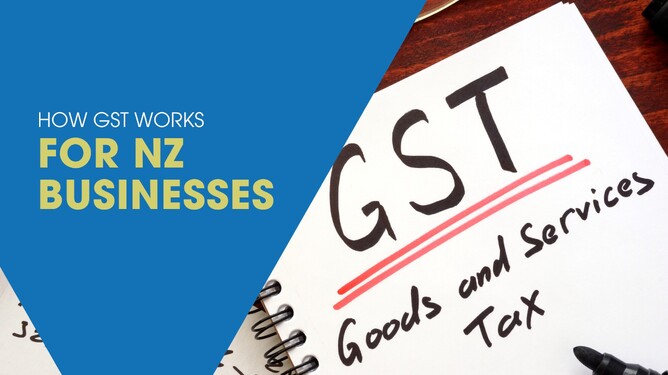GST is a Goods and Services tax collected by the New Zealand Government. It is a consumption tax on products and services bought and sold (including imports) that applies to things we ‘consume’.
In New Zealand, we pay GST because it’s a key source of revenue for the government. The money collected helps fund essential public services like healthcare, education, infrastructure, and welfare.
Businesses collect it on behalf of the government and pass it on to Inland Revenue (IRD). It is designed to ensure that everyone contributes to these essential services.
What is GST?
In New Zealand, GST (Goods and Services Tax) is a 15% tax on most goods and services. You need to register for GST if your business:
Earns over $60,000 in a 12-month period
Charges GST on sales
Wants to claim back GST on expenses (optional if you're under $60k)
Once you're registered, you'll file GST returns — either monthly, two-monthly, or six-monthly.
Who has to pay GST?
If you’re a business owner (whether that’s a sole trader, contractor or company) and you earn over $60,000 in 12 months, you need to register for GST. If you do not, you may be liable for penalties.
Not all businesses have to pay GST. If you expect your turnover to be under $60,000 in 12 months, you do not have to register for GST.
When selling goods overseas, they often qualify as zero-rated for GST purposes. This means the tax rate is 0%. However, you will still need to account for this in your records. Also, some countries have import duties or taxes that your customers may need to pay.
GST is only applicable if you carry out a taxable activity. A taxable activity is the process of supplying goods or services for profit and refers to regular or continuous activity. Therefore, there is no need to register for GST if you are:
Selling the occasional item through Trade Me or Facebook Marketplace.
Earning a salary or wage.
Selling your products as a hobby (be careful with this, because hobbies can quickly become businesses).
Should I register for GST when I first start my business?
If you’re just starting a business, you might be wondering if you should charge GST from the outset. For example, let’s say you’re a plant hobbyist who has now started to sell houseplants online. You’ve purchased supplies, materials, and plants. You could start selling your products online without charging GST, but there are some things to consider.
Reasons to register for GST from the start
If you charge GST from the start, you’re less likely to surprise your clients later when you need to put your prices up and add GST.
You could claim back the GST on the expenses incurred while setting up the business, or because it is easier when dealing with your suppliers.
It can give people the impression that your business is more established and professional.
If you register for GST from the start, you could avoid the $60k threshold surprise.
Reasons to wait
GST does mean more compliance and added work filing GST returns. Not registering means less paperwork.
Adding GST can make you more expensive. If you’re clients are not GST-registered this could make you less competitive.
Registering too soon could lead to cash flow issues and late payment penalties if you haven't planned for the additional tax obligations. You need to ensure you're setting aside funds to cover GST returns to pay the IRD on time.
Some accountants and bookkeepers will advise to register early to keep things consistent and predictable, while others suggest holding off to keep prices lower and admin simpler. The best approach will depend on your business model, clients, and growth plans.
How GST works
When you decide to register for GST, you can do this online with the IRD. As your bookkeeper, I am also happy to help. However, when you complete this process, you will need to keep up with the various tax obligations. This includes:
Including GST in your prices
Providing a tax invoice for your customers
Keeping records and receipts, so you can claim GST on business expenses
Filing and paying GST returns with IRD when they are due.
When you register, you have the choice of filing your returns monthly, bi-monthly, six-monthly or on an accounting basis. Most small and medium businesses choose the bi-monthly or six-monthly option. Choosing bi-monthly can make it easier to keep on top of paperwork.
You need to keep a record of all your invoices and expense receipts and put aside any funds you collect for GST, so you can pass these on when you submit your return.
Below are the key dates for GST returns for your business calendar:
May 7: GST returns due for the tax period ending March 31. This is the last GST return for the previous financial year.
May 28: GST returns due for the period ending April 30.
June 30: GST returns and payment are due for taxable period ending May 31.
August 28: GST return and payment are due for the taxable period ending July 31.
October 28: GST return and payment are due for taxable period ending September 30.
November 28: GST return and payment are due for taxable period October 31.
January 15: GST return and payment are due for the tax period ending November 30.
Can I claim expenses on GST?
If your business is registered, you can claim back the GST paid on goods and services used for your taxable activities.
This system ensures that GST is only a tax on the final consumer, not on businesses involved in the supply chain. Registered businesses act as tax collectors, charging GST on sales and claiming back GST on purchases. This prevents double taxation and ensures that GST is only paid on the end product or service when it reaches the final consumer.
When purchasing goods from overseas, suppliers may not charge GST, but Customs will likely charge GST. If you’re GST-registered and importing goods for taxable business activities, you can claim this GST back.
How do I register for GST?
As your bookkeeper, I can help you handle the registration, ensure you’re charging GST correctly and make sure you're setting aside enough funds. I can also ensure you meet all the legal requirements, that you reconcile your accounts correctly, and file on time to avoid any errors.
Registering for GST is easy. You’ll need your:
IRD number
Business industry classification (BIC) code
And to know how often you want to file your GST return (monthly, bi-monthly, or six-monthly).
N.B. For sole traders, your GST number is your IRD number, and for companies, it’s the same as your company IRD number.
When you file a return, you’ll need to know your total sales and income, total spending (including purchases and expenses), and the amount of GST you’ve charged your customers.
N.B. If your income is below $60,000 a year, you may choose to stop charging GST. However, you will need to deregister with the IRD. If you don’t, you will still be liable to pay GST, even if you’re not passing this cost onto your clients.
Getting into GST Debt
For small businesses especially, and sole traders and contractors, it can be tricky to stay on top of your tax obligations. If you get into debt, you can set up an instalment arrangement with IRD and make regular payments weekly or fortnightly. There’s no fee to set this up and you won’t be charged penalties or interest.
If you’re finding it hard to keep on top of your IRD compliance, then feel free to get in touch. I can save you time, frustration and potentially money.


